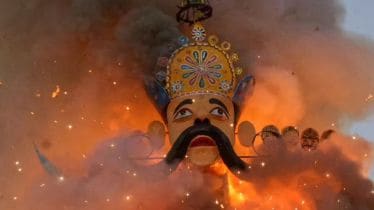Dussehra marks the end of the nine-day Navratri celebrations across India. Also known as Vijayadashmi, it is the day when Lord Rama defeated the demon king Ravana. Across the country, Dussehra is usually celebrated with Ramleela performances and the burning of Ravana’s effigy, along with his son Meghnad (Indrajit) and brother Kumbhkaran. This ritual symbolises the victory of good over evil. Many of us, as kids, would listen to bedtime stories from our grandmothers explaining that Ravana represents evil, and burning his effigy encourages people to ‘burn’ the evil inside themselves.
But here’s something many people don’t know. There are places in India where Ravana isn’t seen as a villain. In fact, in some communities, he’s actually worshipped. Yes, you read that right!
According to the Hindu American Foundation, Ravana, though a demon king, was also a devoted follower of Lord Shiva. He had several boons from Lord Shiva and was exceptionally talented and learned. As per Hindu scriptures, Ravana was the son of Sage Vishravan and Kaikashi, an Asura princess, making him half Brahmin and half demon. Hence, not every place in India burns Ravana’s effigies.
So, where exactly is Ravana worshipped? Let’s take a look.
Bisrakh, Uttar Pradesh – Ravana’s birthplace
The village of Bisrakh in Uttar Pradesh is believed to be Ravana’s birthplace and maternal home, a fact even mentioned in the Ramayana. Because of this, villagers do not burn his effigy. As per the official site of Hindu Scriptures, a temple dedicated to him still exists, and during Dussehra, devotees gather to offer prayers and conduct rituals in his honour instead of witnessing Ravan Dahan.
Himachal Pradesh and Ujjain – Devotee of Shiva
In Baijnath, Himachal Pradesh, Ravana is remembered as a devoted follower of Lord Shiva. As per the official website of Incredible India, he performed penance here to please Shiva, and because of this, people worship him rather than burn his effigy. Similarly, in Ujjain, the sacred city of Mahakal, Ravana is honoured as a Shiva bhakt. On Dussehra, locals observe fasts and perform havan (sacred fire rituals) in his name.
Dashanan Temple, Kanpur (UP)
Kanpur’s Shivala locality has a unique temple called the Dashanan Mandir, which has an idol of Ravana with Lord Shiva. As per the official site of Uttar Pradesh Tourism, the temple opens only on Dussehra, when devotees chant ‘Jai Lankesh’ and worship him as a devotee of Shiva and Goddess Chinmastika. For the rest of the year, the temple remains closed, with the idol covered.
Mandsaur, Madhya Pradesh – Ravana’s in-law’s house
Mandsaur is believed to be the home of Mandodari, Ravana’s wife, which makes him the region’s revered son-in-law. Here, as per the official website of Madhya Pradesh Tourism, Ravana is honoured with prayers, and a 35-foot statue stands in his memory. During Dussehra, locals mourn his death instead of celebrating his defeat to Lord Rama. They also remember his intelligence, achievements, and wisdom.
Kakinada, Andhra Pradesh
In Kakinada, Ravana is celebrated for his devotion to Lord Shiva. The Kumbhabhishekam Temple here is believed to have been established on a site chosen by Ravana himself. Worshippers honour his spiritual connection to Shiva rather than his demon king image, as per the official site of Kakinada district.
Ravangram, Madhya Pradesh – Ravana invited to weddings
According to Madhya Pradesh Tourism, in Vidisha district, the village of Ravangram has a ten-foot reclining statue of Ravana in its temple. Locals fondly call him Ravana Baba and make it a point to invite him first to every wedding ceremony. For them, worshipping Ravana is a way of honouring their family roots and keeping their ancestral legacy alive.
While most of the country marks Dussehra by burning his effigies, several communities remember him for his devotion, intelligence, and as a supreme devotee of Lord Shiva. These traditions show that Ravana’s death was not only about the victory of good over evil but also about knowledge, devotion, and power.
